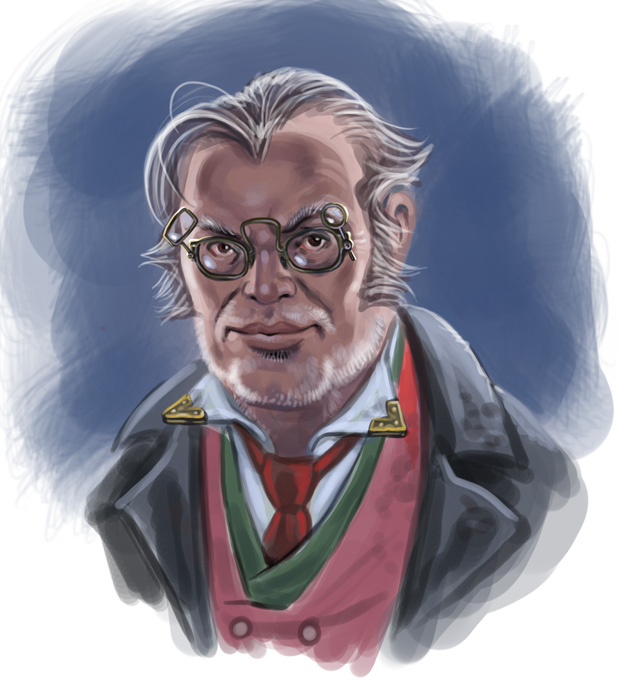 |
| Isaac Dan der Grimnebulin, courtesy of lipatov |
I am an unrepentant fan of Perdido Street Station. Isaac Dan der Grimnebulin, like most of China’s characters, isn’t the greatest beacon of morality you will find in fiction and this makes him feel so much more human as a protagonist. Furthermore I love The Scar, and its anti-hero/antagonist Uther Doul is a continuous mystery in a mystery that we can feel unfold through the eyes of Bellis Coldwine. But this is not a post about fanboying over these two characters, rather it is about the “sciences” that they each dedicate themselves to.
Crisis Energy is the energy of liminal states. It is both and neither kinetic and potential energy. It is the energy of paradoxes and transformations, it is the midway point between apples and oranges. A thrown rock is in a state of crisis. It doesn’t want to fly, it wants to be sitting still on the closest gravitationally significant body. The longer it flies, the more crisis it is in. Grimnebulin figures a way to harvest this Crisis Energy as a self sustaining power source. Continuing the above example, Crisis Energy is used to make that rock fly. The rock, being in this state of Crisis, produces more and more Crisis Energy as it continues to fly, thereby providing the energy to keep it flying. It is a feedback loop offering unlimited energy, limited only by materials and imagination. After all, even Grimnebulin’s Crisis Engine can’t keep up in the end.
Probability Mining is something akin to a fantasy weaponized Schrodinger’s Cat. Few people have not heard one multiversal theory or another that points towards a multitude of alternate dimensions. The Many-Worlds Interpretation, for example, posits that every action you make that involves any sort of choice or alternative results in the birth of countless new realities each representing every possible other alternative to that event. Probability mining takes this concept and runs with it, like a detached rail-car full of nitroglycerin speeding towards Tombstone (pop. 10000.) By essentially stealing from those alternate realities, an adept of Probability Mining can force those other Possibilities to instead be Actualities, or at least pseudo-Actualities. In the distant past, these techniques were used to craft many of the fanciful races of Bas-Lag (likely by modifying the possibilities of evolution) but was also used for sport, song, combat, and a host of other mundane tasks. We get a first hand look at it with the Possible Sword, Doul’s favored weapon, that allows one to strike from every conceivable direction at once. When wielded correctly, this creates something of an inescapable blender.
 |
| Uther Doul and his Possible Sword, courtesy of Ashley Wood |
Bas-Lag is filled with magic, but more often than not it is through a lens of science. Many RPGs, though, are not so limited. A spellcaster wants to fly, so they cast Fly. They don’t need to worry about what is powering the spell, it just works. GLOG makes this a little more interesting as magic is no longer just some Vancian words, but is instead something like a metaphysical zoo. As Skerples of Coins and Scrolls put it spells are “spirit-ferrets, your spellbook is ferret jail, and your mind is a canon.”
I posit that a spellcaster’s mind is a matrix of Crisis Energy, a biological Crisis Engine if you will. It forces itself to believe things that are patently untrue, in order to create a tempting environment for “spell ferrets.” These spells are, in turn, beings of Probability made manifest, living “What-ifs.” What if I were flying right now? What if Jim was on fire? What if Aunt Gertrude could pull herself from the grave and eat people? These are things that are not actualities, these are things that reality as you currently know it has decided isn’t happening. But you’ve just made them happen, by mining possibilities, you’ve created crisis. This is why more complex spells tend to last longer, the Crisis Energy is more self sustaining and more capable of resisting reality’s grasp. It is easy for reality to wave away a ball of flame that exists for a tenth of a second, it is a lot harder for it to ignore Aunt Gertrude gnashing on Jimmy the Cultist’s brain.
 |
| No Gran-Gran! No! |
